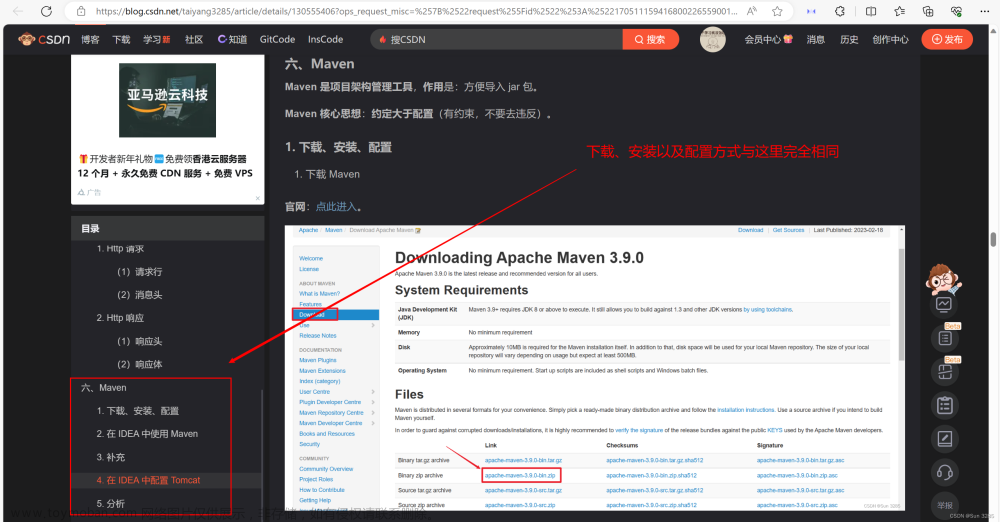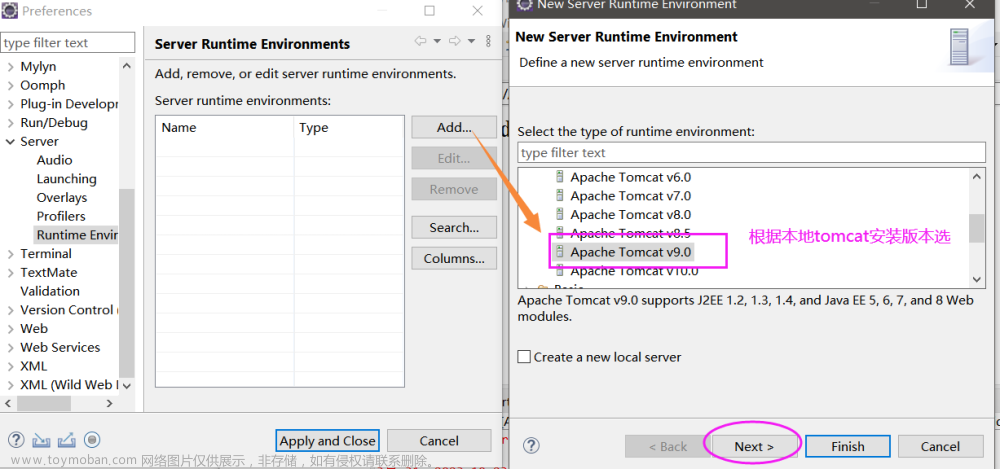这是一个普通 Maven 项目,不是 Spring 或 SpringBoot 项目。
下面都用到了这个工具类:
package com.gtcom.search.util;
import com.gtcom.search.exception.ExceptionEnum;
import com.gtcom.search.exception.SearchException;
import lombok.extern.slf4j.Slf4j;
import java.io.File;
import java.io.IOException;
import java.io.InputStream;
import java.io.InputStreamReader;
import java.nio.charset.StandardCharsets;
import java.util.Objects;
import java.util.Properties;
/**
* 配置文件加载工具类
*
* @author wangbo
* @date 2022/2/28
*/
@Slf4j
public class LoadUtils {
private LoadUtils() {
throw new IllegalStateException("Utility class");
}
private static final String APPLICATION_PREFIX = "application-";
/**
* 获取运行时配置
*/
public static Properties getProperties() {
//只能读取到命令行的启动参数:-Dspring.profiles.active=xxx
//读取不到配置文件中的配置项:spring.profiles.active=xxx
String active = System.getProperty("spring.profiles.active");
if (Objects.isNull(active)) {
active = "dev";
}
log.info("current runtime environment active = [{}]", active);
Properties props = new Properties();
try {
//尝试加载properties文件
InputStream resourceAsStream = LoadUtils.class.getClassLoader().getResourceAsStream(File.separator + APPLICATION_PREFIX + active + ".properties");
if (Objects.nonNull(resourceAsStream)) {
props.load(resourceAsStream);
return props;
}
//尝试加载yml文件
resourceAsStream = LoadUtils.class.getClassLoader().getResourceAsStream(File.separator + APPLICATION_PREFIX + active + ".yml");
if (Objects.nonNull(resourceAsStream)) {
props.load(new InputStreamReader(resourceAsStream, StandardCharsets.UTF_8));
return props;
}
} catch (IOException e) {
log.error("load application config file exception", e);
throw new SearchException(ExceptionEnum.CONFIG_LOAD_EXCEPTION);
}
log.error("not loaded into the application config file");
throw new SearchException(ExceptionEnum.CONFIG_LOAD_EXCEPTION);
}
}
这个工具类能读取 properties 和 yml 格式的配置文件,环境指定必须使用命令行参数的形式,否则加载不到。
1. 集成 Elasticsearch
1.1. 依赖
<dependency>
<groupId>org.elasticsearch.client</groupId>
<artifactId>elasticsearch-rest-high-level-client</artifactId>
</dependency>
1.2. 配置
1.2.1. 配置文件
properties
#ES新闻集群
elasticsearch.news.hosts=10.1.2.11:9200,10.1.2.12:9200,10.1.2.13:9200
elasticsearch.news.username=admin
elasticsearch.news.password=test
#ES社交集群
elasticsearch.social.hosts=10.1.2.14:9200,10.1.2.15:9200,10.1.2.16:9200
elasticsearch.social.username=admin
elasticsearch.social.password=test
yml:
#ES新闻集群
elasticsearch.news.hosts: 10.1.2.11:9200,10.1.2.12:9200,10.1.2.13:9200
elasticsearch.news.username: admin
elasticsearch.news.password: test
#ES社交集群
elasticsearch.social.hosts: 10.1.2.14:9200,10.1.2.15:9200,10.1.2.16:9200
elasticsearch.social.username: admin
elasticsearch.social.password: test
1.2.2. 配置类
package com.gtcom.search.config;
import com.gtcom.search.constant.Separators;
import com.gtcom.search.util.LoadUtils;
import lombok.extern.slf4j.Slf4j;
import org.apache.http.HttpHost;
import org.apache.http.auth.AuthScope;
import org.apache.http.auth.UsernamePasswordCredentials;
import org.apache.http.client.CredentialsProvider;
import org.apache.http.impl.client.BasicCredentialsProvider;
import org.elasticsearch.client.RestClient;
import org.elasticsearch.client.RestClientBuilder;
import org.elasticsearch.client.RestHighLevelClient;
import java.util.Properties;
import java.util.concurrent.TimeUnit;
/**
* Elastic配置
*
* @author wangbo
* @date 2021/12/7
*/
@Slf4j
public class ElasticConfig {
private ElasticConfig() {
throw new IllegalStateException("Utility class");
}
private static final RestHighLevelClient ES_NEWS_CLIENT;
private static final RestHighLevelClient ES_SOCIAL_CLIENT;
static {
Properties properties = LoadUtils.getProperties();
//初始化客户端
String newsHosts = properties.getProperty("elasticsearch.news.hosts");
String newsUserName = properties.getProperty("elasticsearch.news.username");
String newsPassword = properties.getProperty("elasticsearch.news.password");
ES_NEWS_CLIENT = init(newsHosts, newsUserName, newsPassword);
String socialHosts = properties.getProperty("elasticsearch.social.hosts");
String socialUserName = properties.getProperty("elasticsearch.social.username");
String socialPassword = properties.getProperty("elasticsearch.social.password");
ES_SOCIAL_CLIENT = init(socialHosts, socialUserName, socialPassword);
}
/**
* 初始化ES集群客户端
*
* @param hosts 服务地址
* @param username 用户名称
* @param password 用户密码
* @return ES集群客户端
*/
private static RestHighLevelClient init(String hosts, String username, String password) {
String[] hostArray = hosts.split(Separators.COMMA);
HttpHost[] httpHosts = new HttpHost[hostArray.length];
for (int i = 0; i < hostArray.length; i++) {
httpHosts[i] = HttpHost.create(hostArray[i]);
}
RestClientBuilder restClientBuilder = RestClient.builder(httpHosts);
//设置超时时间
restClientBuilder.setRequestConfigCallback(
builder -> builder.setConnectTimeout(5000).setSocketTimeout(60000)
);
//配置身份验证和KeepAlive
final CredentialsProvider credentialsProvider = new BasicCredentialsProvider();
credentialsProvider.setCredentials(AuthScope.ANY, new UsernamePasswordCredentials(username, password));
restClientBuilder.setHttpClientConfigCallback(
httpClientBuilder -> httpClientBuilder.setDefaultCredentialsProvider(credentialsProvider)
.setKeepAliveStrategy((response, context) -> TimeUnit.MINUTES.toMillis(3))
);
return new RestHighLevelClient(restClientBuilder);
}
/**
* 获取ES新闻客户端
*/
public static RestHighLevelClient getEsNewsClient() {
return ES_NEWS_CLIENT;
}
/**
* 获取ES社交客户端
*/
public static RestHighLevelClient getEsSocialClient() {
return ES_SOCIAL_CLIENT;
}
}
1.3. 使用
下面用新闻客户端示例,社交客户端使用一样:
//查询条数
CountResponse countResponse;
try {
countResponse = ElasticConfig.getEsNewsClient().count(countRequest, RequestOptions.DEFAULT);
} catch (Exception e) {
log.error("查询【新闻条数】发生异常", e);
throw new SearchException(ExceptionEnum.ELASTIC_SEARCH_EXCEPTION);
}
//查询数据
SearchResponse searchResponse;
try {
searchResponse = ElasticConfig.getEsNewsClient().search(searchRequest, RequestOptions.DEFAULT);
} catch (Exception e) {
log.error("查询【新闻数据】发生异常", e);
throw new SearchException(ExceptionEnum.ELASTIC_SEARCH_EXCEPTION);
}
2. 集成 Redis
2.1. 依赖
<dependency>
<groupId>redis.clients</groupId>
<artifactId>jedis</artifactId>
</dependency>
<dependency>
<groupId>org.apache.commons</groupId>
<artifactId>commons-pool2</artifactId>
</dependency>
2.2. 配置
2.2.1. 配置文件
这里支持两种配置方式:单机和哨兵。
2.2.1.1. 单机配置
单机版 properties:
#Redis配置:单机stand-alone/哨兵sentinel
redis.config.mode=stand-alone
redis.stand-alone.hosts=192.168.10.11
redis.stand-alone.port=6379
单机版 yml:
#Redis配置:单机stand-alone/哨兵sentinel
redis.config.mode: stand-alone
redis.stand-alone.hosts: 192.168.10.11
redis.stand-alone.port: 6379
2.2.1.2. 哨兵配置
哨兵版 properties:
#Redis配置:单机stand-alone/哨兵sentinel
redis.config.mode=sentinel
redis.sentinel.password=12345
redis.sentinel.master=mymaster
redis.sentinel.nodes=10.6.22.14:26380,10.6.22.14:26381,10.6.22.14:26382
哨兵版 yml:文章来源:https://www.toymoban.com/news/detail-406917.html
#Redis配置:单机stand-alone/哨兵sentinel
redis.config.mode: sentinel
redis.sentinel.password: 12345
redis.sentinel.master: mymaster
redis.sentinel.nodes: 10.6.10.11:26380,10.6.10.11:26381,10.6.10.11:26382
2.2.2. 配置类
package com.gtcom.search.config;
import com.gtcom.search.exception.ExceptionEnum;
import com.gtcom.search.exception.SearchException;
import com.gtcom.search.util.LoadUtils;
import lombok.extern.slf4j.Slf4j;
import org.apache.commons.lang3.StringUtils;
import redis.clients.jedis.Jedis;
import redis.clients.jedis.JedisPool;
import redis.clients.jedis.JedisPoolConfig;
import redis.clients.jedis.JedisSentinelPool;
import java.util.Arrays;
import java.util.HashSet;
import java.util.Properties;
/**
* Redis配置
*
* @author wangbo
* @date 2022/1/24
*/
@Slf4j
public class RedisConfig {
private RedisConfig() {
throw new IllegalStateException("Utility class");
}
private static final JedisPool JEDIS_POOL;
private static final JedisSentinelPool JEDIS_SENTINEL_POOL;
private static final String redisConfigMode;
static {
//临时变量
JedisPool jedisPool = null;
JedisSentinelPool jedisSentinelPool = null;
Properties properties = LoadUtils.getProperties();
//Redis配置模式:单机stand-alone/哨兵sentinel
redisConfigMode = properties.getProperty("redis.config.mode");
if ("stand-alone".equals(redisConfigMode)) {
JedisPoolConfig jedisPoolConfig = new JedisPoolConfig();
jedisPoolConfig.setTestOnBorrow(true);
String hosts = properties.getProperty("redis.stand-alone.hosts");
int port = Integer.parseInt(properties.getProperty("redis.stand-alone.port"));
//有密码和没密码不同
String password = properties.getProperty("redis.stand-alone.password");
if (StringUtils.isBlank(password)) {
jedisPool = new JedisPool(jedisPoolConfig, hosts, port);
} else {
jedisPool = new JedisPool(jedisPoolConfig, hosts, port, 5000, password);
}
} else if ("sentinel".equals(redisConfigMode)) {
String masterName = properties.getProperty("redis.sentinel.master");
String nodes = properties.getProperty("redis.sentinel.nodes");
String[] split = nodes.split(",");
HashSet<String> sentinels = new HashSet<>(Arrays.asList(split));
String password = properties.getProperty("redis.sentinel.password");
jedisSentinelPool = new JedisSentinelPool(masterName, sentinels, password);
} else {
log.error("redis config mode error, mode = {}", redisConfigMode);
throw new SearchException(ExceptionEnum.CONFIG_LOAD_EXCEPTION);
}
JEDIS_POOL = jedisPool;
JEDIS_SENTINEL_POOL = jedisSentinelPool;
}
/**
* 获取Jedis连接池
*/
public static Jedis getJedis() {
if ("stand-alone".equals(redisConfigMode)) {
return JEDIS_POOL.getResource();
} else if ("sentinel".equals(redisConfigMode)) {
return JEDIS_SENTINEL_POOL.getResource();
}
return null;
}
}
2.3. 使用
就是 Jedis 的使用方法,下面简单示例:文章来源地址https://www.toymoban.com/news/detail-406917.html
/**
* 从Redis获取索引列表
*
* @param redisKey redis key
* @return 索引列表
*/
public static List<String> getIndexListFromRedis(String redisKey) {
try (Jedis jedis = RedisConfig.getJedis()) {
assert jedis != null;
String indexListStr = jedis.get(redisKey);
if (StringUtils.isBlank(indexListStr)) {
log.warn("从Redis查询索引列表为空,redisKey = {}", redisKey);
return Collections.emptyList();
}
return JSON.parseArray(indexListStr).toJavaList(String.class);
} catch (Exception e) {
log.error("从Redis查询索引列表异常,redisKey = {}", redisKey, e);
return Collections.emptyList();
}
}
到了这里,关于Maven 项目集成 Elasticsearch 和 Redis的文章就介绍完了。如果您还想了解更多内容,请在右上角搜索TOY模板网以前的文章或继续浏览下面的相关文章,希望大家以后多多支持TOY模板网!













